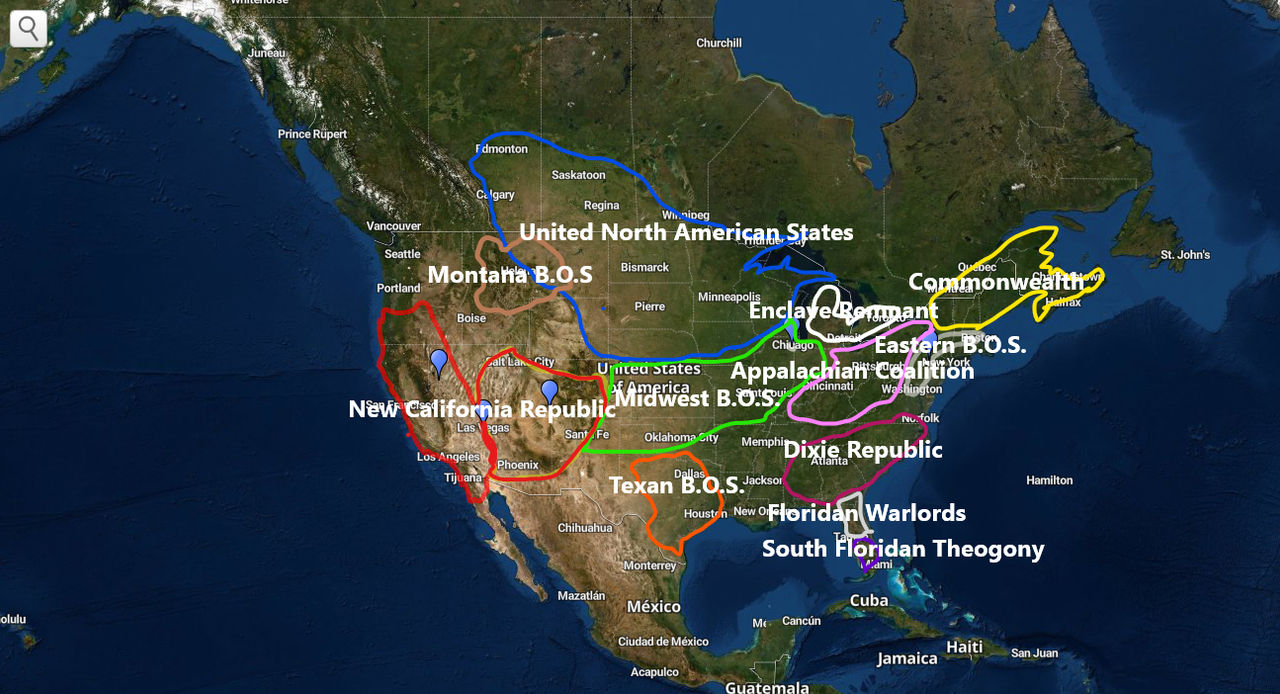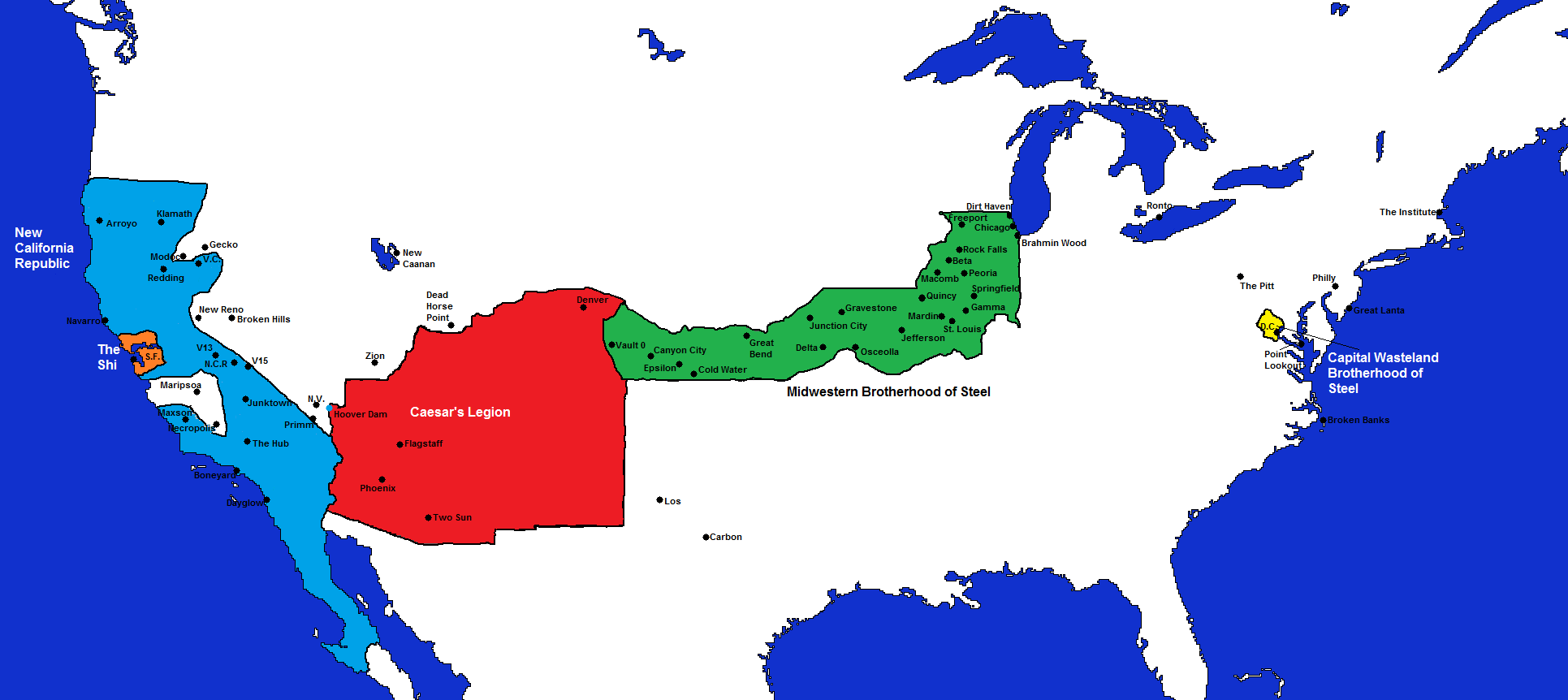The Fallout Political Map: A Post-Apocalyptic Landscape Of Power
The Fallout Political Map: A Post-Apocalyptic Landscape of Power
Related Articles: The Fallout Political Map: A Post-Apocalyptic Landscape of Power
Introduction
In this auspicious occasion, we are delighted to delve into the intriguing topic related to The Fallout Political Map: A Post-Apocalyptic Landscape of Power. Let’s weave interesting information and offer fresh perspectives to the readers.
Table of Content
The Fallout Political Map: A Post-Apocalyptic Landscape of Power

The Fallout series, a beloved franchise in the gaming world, is renowned for its intricate world-building, particularly its depiction of a post-nuclear America. This post-apocalyptic landscape is not only a canvas for thrilling adventures but also a fascinating study of power dynamics and societal structures in the wake of a devastating catastrophe. The Fallout political map, a complex tapestry of factions vying for control and survival, offers a unique perspective on the human condition, revealing the enduring struggle for power and the enduring quest for order in the face of chaos.
A Fragmented Nation: The Fallout Political Map
The Fallout political map is a testament to the fragmentation of the United States following the Great War, a nuclear conflict that shattered the nation and left behind a desolate wasteland. In this fractured landscape, various factions have emerged, each with its own ideology, goals, and territory. These factions, ranging from militaristic enclaves to religious communities, represent a diverse spectrum of responses to the apocalypse.
Key Factions and Their Influence:
- The Enclave: A militaristic faction, remnants of the pre-war US government, seeking to establish a new order through technological dominance and genetic purity. Their influence extends across the wasteland, their advanced technology and resources making them a formidable force.
- The Brotherhood of Steel: A technologically advanced order dedicated to preserving pre-war technology and knowledge. Their presence is felt throughout the wasteland, their strict adherence to order and control creating both allies and adversaries.
- The Institute: A secretive organization of synths, advanced artificial beings, seeking to replace humanity with their own creations. Their influence, while covert, is significant, as they manipulate events behind the scenes to achieve their goals.
- The Raiders: Ruthless gangs of scavengers and marauders, driven by survival and the pursuit of power. Their influence is localized, their presence a constant threat to settlements and travelers alike.
- The Minutemen: A militia dedicated to protecting settlements and rebuilding the Commonwealth. Their influence is limited to the Commonwealth region, their strength lying in their dedication to community and cooperation.
- The Railroad: A resistance group dedicated to protecting synths from persecution. Their influence is largely underground, their network of safe houses and allies providing a lifeline for synths seeking freedom.
- The Children of Atom: A religious cult worshipping the Atom Bomb, seeking to bring about a new apocalypse. Their influence is localized, their presence marked by fanaticism and violence.
The Dynamics of Power:
The Fallout political map is not static; it is constantly evolving as factions clash, alliances shift, and new threats emerge. The struggle for resources, territory, and power is a constant theme, driving the narrative of the Fallout games. This dynamic interplay of factions, each with its own motivations and ambitions, creates a complex web of relationships, where cooperation and conflict are intertwined.
Beyond Power: Themes of Survival and Morality
The Fallout political map goes beyond mere power struggles. It explores the human condition in the face of adversity, highlighting themes of survival, morality, and the enduring spirit of humanity. In the face of devastation, factions grapple with questions of morality, seeking to rebuild society while navigating the ethical dilemmas of a world ravaged by war.
The Importance of the Fallout Political Map:
The Fallout political map serves as a microcosm of human nature, reflecting the complexities of power, survival, and morality in a post-apocalyptic world. It offers a compelling commentary on the fragility of civilization, the enduring human desire for order, and the resilience of the human spirit.
FAQs about the Fallout Political Map:
-
What are the major factions in the Fallout universe?
- The Enclave, the Brotherhood of Steel, the Institute, the Raiders, the Minutemen, the Railroad, and the Children of Atom are some of the prominent factions.
-
How do these factions interact with each other?
- Factions engage in alliances, conflict, and competition, driven by their ideologies, goals, and resources.
-
What are the key themes explored in the Fallout political map?
- The map highlights themes of power, survival, morality, and the human condition in the face of devastation.
-
How does the Fallout political map influence gameplay?
- It shapes the narrative, provides players with choices and consequences, and creates a dynamic environment for exploration and interaction.
-
Is the Fallout political map static or dynamic?
- The map is dynamic, constantly evolving as factions clash, alliances shift, and new threats emerge.
Tips for Understanding the Fallout Political Map:
- Explore the world: Travel to different regions, interact with factions, and gather information to gain a comprehensive understanding of the political landscape.
- Listen to dialogue: Pay attention to conversations between characters, as they reveal insights into faction motivations and relationships.
- Read in-game lore: Explore terminals, holotapes, and other sources of information to gain a deeper understanding of the factions’ history and ideologies.
- Consider the consequences of your actions: Every choice you make can impact the political landscape, influencing the fate of factions and the world around you.
Conclusion:
The Fallout political map, a tapestry woven from the threads of power, survival, and morality, offers a poignant reflection on the human condition. It is a testament to the enduring spirit of humanity, the complexities of power, and the ever-present struggle for order in a world forever changed by catastrophe. By understanding the political landscape of the Fallout universe, players can engage with the game on a deeper level, appreciating the intricate world-building and the nuanced narrative that unfolds within it.








Closure
Thus, we hope this article has provided valuable insights into The Fallout Political Map: A Post-Apocalyptic Landscape of Power. We thank you for taking the time to read this article. See you in our next article!